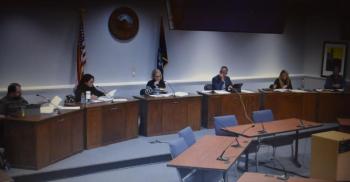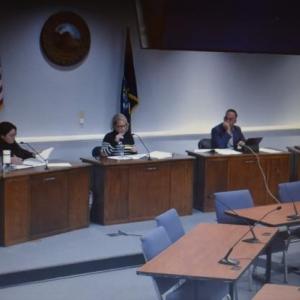City attorney to Rockland City Council: Immigration ordinance is a slippery slope
ROCKLAND — Despite three months of working on immigration language with a City Councilor for that councilor’s proposed amendment, Police Chief Tim Carroll continues to voice discomfort with the ordinance. The same discomfort is being verbalized in greater depth by the City’s attorney, and in the process, a new underlying pondering of “who’s the boss?” is railroading some conversations.
And, as opposed to a similar round of discussions in June, this new round comes on the heels of councilors’ own talks with an attorney from Maine’s branch of the American Civil Liberties Union. That representative watched the November 3, 2025 Agenda-Setting meeting of Rockland City Council via webinar, according to Councilors, and will attend next week’s regular Council meeting in person.
A great deal was said in 25 minutes during the November 3 meeting regarding #53 Chapter 2, Article XIII Immigration Enforcement: An amendment to the City’s Administration Ordinance to prohibit any City employee, acting intheir capacity as such, to assist or cooperate with, or allow any municipal monies or resources to be used to assist, cooperate with, or facilitate any federal agency in any immigration enforcement operation, except where legally required to do so by state or federal law or court order.
City Attorney, Employee Handbooks, ACLU
Most of the attention was directed to Rockland’s City attorney, Mary Costigan, of Bernstein Shur, who also held her own discussion with the ACLU attorney prior to the Nov. 3 meeting.
“This is an ordinance,” said Costigan, putting extra emphasis on the word ordinance. “So, it is law,” she said, with emphasis on the word law. “You are setting up a situation where you are telling employees that they will break the law if they do XY and Z while they are trying to perform the duties of a job that are established over here [pointing away from the room]. And it’s also an ordinance that has no enforcement mechanism. This Council has no enforcement authority.”
The ordinance, she said, is a gray area, and one in which the Council could create as a mechanism by which a citizen can try to sue the City, or try to sue an individual employee that the City would have to defend. However, if an employee did do something, they are not under the Council’s control.
“You can’t discipline them, you can’t do anything about it,” she said.
City Council is not the boss of the employees.
“You’re not the employer of employees who are under the City Manager,” she said. “You are the employer of me [Costigan] and Tom [Luttrell, City Manager] and Stuart [Sylvester, City Clerk]. “So you can tell us what to do. But, you can’t tell Tom’s employees what to do. You can’t tell the chief what to do. You can’t tell the chief how to tell his employees what to do.”
Councilors Nate Davis and Adam Lachman both asked for extended explanation on this subject. Davis alluded to the Employee Handbook, which is approved by City Council. Lachman talked of Council directives to the City Manager as to how to direct employees. A question was also asked about what makes an ordinance different from a policy or resolution, both of which Costigan would prefer for this immigration topic, as opposed to an ordinance.
A handbook, according to Costigan, is a policy regarding benefits “and if they misbehave, they’re not going to you [Council], they are going to him [actual boss],” she said.
Yes, she said, there are ordinances out there that lay out job duties, according to Costigan. An example given is “The code officer shall review permits.”
“But it’s not “you – code officer – while you are doing your job, you have to wear a red shirt.”
The slippery slope, she said, is in the context.
-An ordinance is outward facing, it’s a public document. The public does have, arguably, if somebody has a personalized injury, based on something somebody does under that ordinance, they potentially have a claim. It’s outward facing.
-A resolution or a policy is inward facing. You are asking the manager to establish a policy. One example: discuss XY and Z with the employees. That then comes with some understanding by an employee of – OK, if my boss is telling me – my actual boss – is telling me that I have to do something, and I don’t do it, there is a disciplinary process. There’s an actual process as to how that’s managed, which is not the same as just ordinance.
Costigan also warned that this ordinance leaves a perception as being enacted because Council members want to cut down two levels and get to the employees.
“You can do whatever you want,” said Costigan to Council. “This is my warning, my worst-case scenario.”
Of the proposed ordinance, she said, “It’s just messy. It’s crossing a line. It’s questionable.”
Rockland Police Department, Councilor Callahan, and a shared outcome?
The ordinance is also not just about the Rockland Police Department, according to Councilor Kaitlyn Callahan, sponsor of this ordinance. In fact, “It’s not about the Rockland Police Department at all,” she said.
“We now know that,” she continued. “Tom and I had this conversation. We all had it with the Maine ACLU and the implications to general assistance and other things is that this could interrupt down the line. So, I also just want to make that very clear…. It’s not just about the work that’s happening within the police department. There are other things that could be at stake, so I think that we all need to consider that as we move forward.
Chief Carroll and Councilor Callahan worked through a final staging of ordinance language over the past three months.
“We went over this language, and we made lots of changes, and negotiated, and we had the conversation we had right now,” said Callahan. “And when we left that meeting, everybody was good with the wording.
To Carroll, Callahan said: “I do see your perspective and how it could be difficult. But I do think it’s pretty clear and cut and dry.”
Carroll, on the other hand, sees the situation differently. Yes, they worked together for three months, but, “I still just keep reading it through and looking at it – I’m still uncomfortable with exactly what actions are expected of me and the police department, regarding this ordinance. It just puts us in some conflict, I think, with how we’re going to do – or how we do – our job when it comes to assisting or helping other law enforcement agencies.”
Rockland PD doesn’t do immigration enforcement, said Carroll.
“I have policy and guidelines on what I can do as a police chief and what I have my staff do, or not do; a lot of the language is already part of our function as the Rockland Police Department.”
In trying to create a scenario regarding ICE coming to Rockland, Carroll said he or his officers may need to assist, but RPD may not know the details of what they are assisting with.
“I don’t know exactly what I’m helping that ICE agent for,” said Carroll, in the fictionalized scenario. “I know it’s a law enforcement officer and a person, and maybe it’s a fight. I’m there for public safety reasons. So the agent doesn’t get hurt. As well as, the citizen doesn’t get hurt. And what happens after that, that’s not my call....and now I’ve got assault charges.”
See our previous article: https://www.penbaypilot.com/article/thinking-about-humans-following-law-rockland-council-vote-ice-ordinance-june-9/258940
Reach Sarah Thompson at news@penbaypilot.com



























